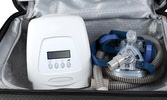CPAP, or continuous positive airway pressure, is a form of therapy for individuals with sleep apnea. By placing a mask over your nose and mouth, the machine delivers constant air pressure and keeps your airway open while you sleep. CPAP therapy, while extremely beneficial and important for a restful night, does come with a few problems that can be avoided.
1. Leaky Mask
Most of the time, a leaky mask just means you have the wrong size or style. To make sure your CPAP mask fits properly, talk to your healthcare provider so they can give you recommendations. For example, if you have a smaller face, there are CPAP masks made specifically for those who need a smaller frame. If the mask is for your child, there are cute pediatric CPAP masks made just for them, too. It’s crucial for your mask to fit properly, otherwise, you won’t be getting the air pressure you need for CPAP therapy to be effective.
2. Dry Mouth
If you just started CPAP therapy, dry mouth is a very common struggle since you aren’t used to the air pressure. If your jaw opens during sleep, CPAP devices tend to worsen dry mouth which is why keeping your mouth closed at night can help. Find a mask that includes a chin strap which can help keep your mouth closed while you sleep.
3. Compliance Issues
It’s extremely common for individuals to struggle with getting used to using a CPAP machine at night, so don’t be alarmed. There are various tricks you can try to make the compliance process as smooth as possible:
- Start slowly by only wearing your mask during naps or while you’re relaxing, then slowly ease into wearing it at night.
- Do your research and read your machine manual to make sure you’re doing everything properly.
- Make it part of your nighttime routine so you train your mind to get used to it.
- Try relaxation techniques before bedtime to ease yourself into a restful state with your mask on.
4. Stuffy Nose
Many CPAP machines include an attachable heated humidifier which helps prevent dry, stuffy noses. Leaky masks can also lead to nose irritation, so remember to make sure your mask fits properly and there isn’t air leakage.
5. Pressure Sores or Skin Irritation
Wearing anything for an extended period of time can lead to irritation, and that’s especially true for something like a CPAP mask that you wear for hours at a time. Make sure you tell your doctor if you develop skin sores. One way to avoid this is to, once again, make sure your mask fits correctly or switch mask types altogether. Masks with nasal pillows are a great option if you’re struggling with skin irritation.
Whether you were just diagnosed with sleep apnea and don’t know what to expect or you’ve been using CPAP therapy for a while and are experiencing issues, we’re here to help you through the process. Getting used to a CPAP machine isn’t easy, so feel free to contact us with any questions – we're happy to help!

